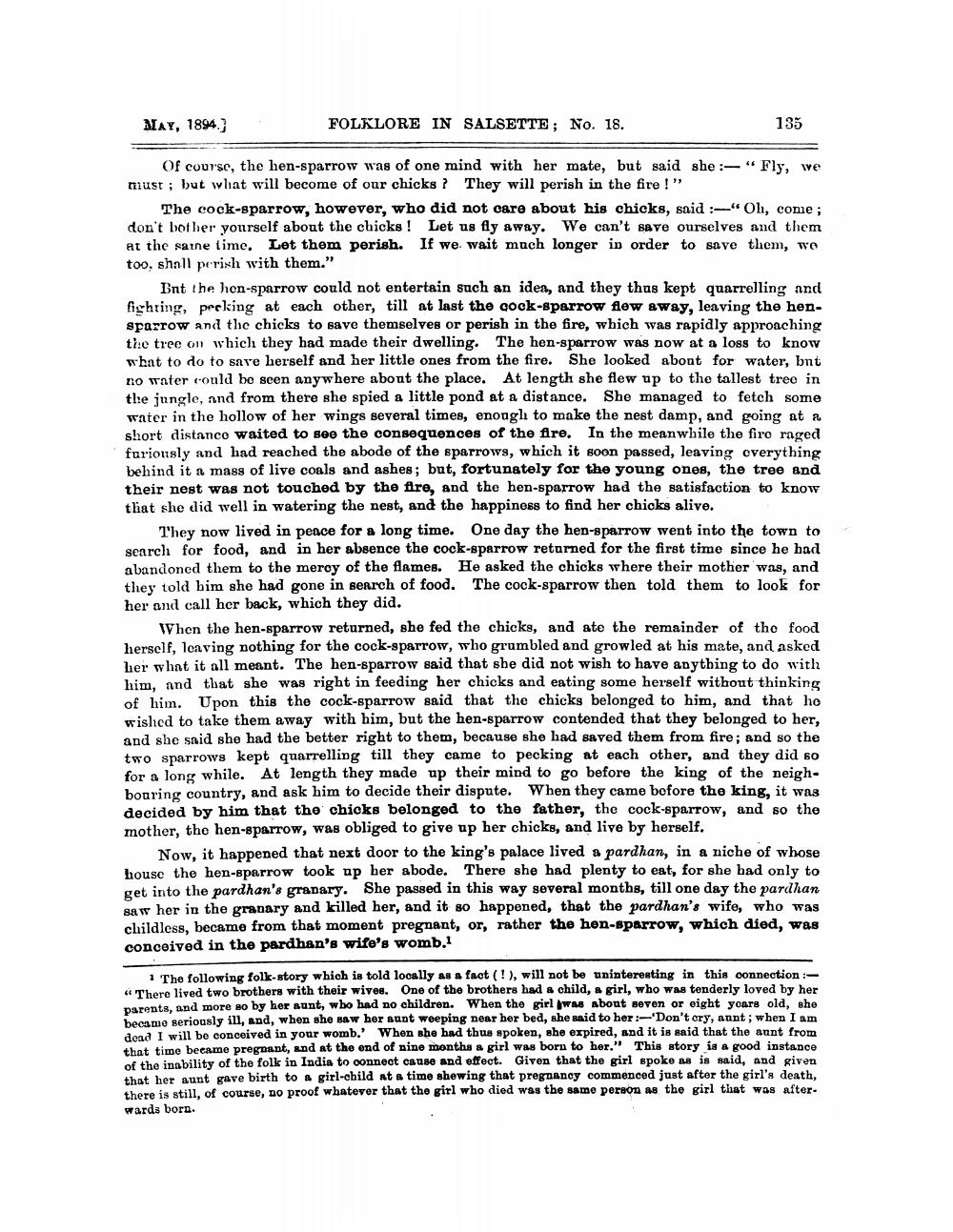________________
FOLKLORE IN SALSETTE; No. 18.
MAY, 1894.]
Of course, the hen-sparrow was of one mind with her mate, but said she:-"Fly, we must; but what will become of our chicks? They will perish in the fire!"
135
The cock-sparrow, however, who did not care about his chicks, said :-"Oh, come; don't bother yourself about the chicks! Let us fly away. We can't save ourselves and them at the same time. Let them perish. If we wait much longer in order to save them, we too, shall perish with them."
Bnt the hen-sparrow could not entertain such an idea, and they thus kept quarrelling and fighting, pecking at each other, till at last the cock-sparrow flew away, leaving the hensparrow and the chicks to save themselves or perish in the fire, which was rapidly approaching the tree on which they had made their dwelling. The hen-sparrow was now at a loss to know what to do to save herself and her little ones from the fire. She looked about for water, bnt no water could be seen anywhere about the place. At length she flew up to the tallest tree in the jungle, and from there she spied a little pond at a distance. She managed to fetch some water in the hollow of her wings several times, enough to make the nest damp, and going at a short distance waited to see the consequences of the fire. In the meanwhile the fire raged furiously and had reached the abode of the sparrows, which it soon passed, leaving everything behind it a mass of live coals and ashes; but, fortunately for the young ones, the tree and their nest was not touched by the fire, and the hen-sparrow had the satisfaction to know that she did well in watering the nest, and the happiness to find her chicks alive.
They now lived in peace for a long time. One day the hen-sparrow went into the town to search for food, and in her absence the cock-sparrow returned for the first time since he had abandoned them to the mercy of the flames. He asked the chicks where their mother was, and they told him she had gone in search of food. The cock-sparrow then told them to look for her and call her back, which they did.
When the hen-sparrow returned, she fed the chicks, and ate the remainder of the food. herself, leaving nothing for the cock-sparrow, who grumbled and growled at his mate, and asked her what it all meant. The hen-sparrow said that she did not wish to have anything to do with him, and that she was right in feeding her chicks and eating some herself without thinking of him. Upon this the cock-sparrow said that the chicks belonged to him, and that he wished to take them away with him, but the hen-sparrow contended that they belonged to her, and she said she had the better right to them, because she had saved them from fire; and so the two sparrows kept quarrelling till they came to pecking at each other, and they did so for a long while. At length they made up their mind to go before the king of the neighbouring country, and ask him to decide their dispute. When they came before the king, it was decided by him that the chicks belonged to the father, the cock-sparrow, and so the mother, the hen-sparrow, was obliged to give up her chicks, and live by herself.
Now, it happened that next door to the king's palace lived a pardhan, in a niche of whose house the hen-sparrow took up her abode. There she had plenty to eat, for she had only to get into the pardhan's granary. She passed in this way several months, till one day the pardhan saw her in the granary and killed her, and it so happened, that the pardhan's wife, who was childless, became from that moment pregnant, or, rather the hen-sparrow, which died, was conceived in the pardhan's wife's womb.1
1 The following folk-story which is told locally as a fact (!), will not be uninteresting in this connection:There lived two brothers with their wives. One of the brothers had a child, a girl, who was tenderly loved by her parents, and more so by her aunt, who had no children. When the girl was about seven or eight years old, she became seriously ill, and, when she saw her aunt weeping near her bed, she said to her :-'Don't cry, annt; when I am dead I will be conceived in your womb.' When she had thus spoken, she expired, and it is said that the aunt from that time became pregnant, and at the end of nine months a girl was born to her." This story is a good instance of the inability of the folk in India to connect cause and effect. Given that the girl spoke as is said, and given that her aunt gave birth to a girl-child at a time shewing that pregnancy commenced just after the girl's death, there is still, of course, no proof whatever that the girl who died was the same person as the girl that was afterwards born.




